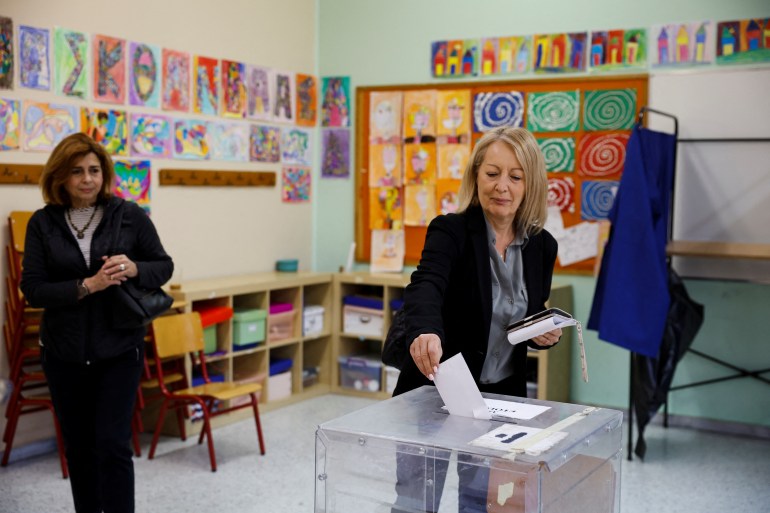Voting is under way in Greece’s parliamentary election, the first since the country’s economy ceased to be subject to strict supervision and control by international lenders who had provided bailout funds during its nearly decade-long financial crisis.
The two main contenders in Sunday’s vote are conservative Prime Minister Kyriakos Mitsotakis, 55, a Harvard-educated former banking executive, and 48-year-old Alexis Tsipras, who heads the left-wing Syriza party and served as prime minister during some of the most turbulent years of the financial crisis.
Although Mitsotakis has been steadily ahead in opinion polls, a newly introduced electoral system of proportional representation makes it unlikely that whoever wins the election will be able to garner enough seats in Greece’s 300-member parliament to form a government without seeking coalition partners.
The winner of Sunday’s election will have three days to negotiate a coalition with one or more other parties. If that fails, the mandate to form a government is then given to the second-largest party. But deep divisions between the two main parties and four smaller ones expected to enter parliament mean a coalition will be hard to come by, making a second election likely on July 2.
The second election would be held under a new electoral law which makes it easier for a winning party to form a government by giving it a bonus of up to 50 seats in parliament.
A total of 32 parties are vying for votes, although opinion polls have indicated only six have a realistic chance of meeting the 3 percent threshold to gain seats in parliament.
Greece’s once-dominant socialist party PASOK is likely to be at the centre of any coalition talks. Overtaken by Syriza during the 2009-18 financial crisis, the party has been polling at about 10 percent. Its leader, Nikos Androulakis, 44, was at the centre of a wiretapping scandal in which his phone was targeted for surveillance.
Polling at about 10 percent, PASOK would be vital in any coalition deal, but Androulakis’s poor relationship with Mitsotakis, who he accuses of covering up the wiretapping scandal, means a deal with the conservatives is unlikely. His relationship with Tsipras is also poor, accusing him of trying to poach PASOK voters.
The far-right Greeks Party, founded by a jailed former lawmaker with a history of neo-Nazi activity, was banned from participating by the Supreme Court. His former party, Golden Dawn, which rose to become Greece’s third largest during the financial crisis, was deemed to be a criminal organisation.

Campaigning
In the run-up to the election, Mitsotakis had enjoyed a double-digit lead in opinion polls, but saw that erode following a railway disaster on February 28 that killed 57 people after an intercity passenger train was put on the same rail line as an oncoming freight train. It was later revealed that train stations were poorly staffed and safety infrastructure broken and outdated.
The government was also battered by a surveillance scandal in which prominent Greek politicians, including Androulakis, and journalists discovered spyware on their phones. The prime minister said he had not been aware of the tapping of Androulakis’s phone, and that he would not have allowed it had he known. But the revelations deepened mistrust among the country’s political parties at a time when consensus may be badly needed.
Tsipras has campaigned heavily on the rail disaster and wiretapping scandal.
In power since the 2019 elections, Mitsotakis has delivered unexpectedly high growth, a steep drop in unemployment and a country on the brink of returning to investment grade on the global bond market for the first time since it lost market access in 2010, at the start of its financial crisis.
Debts from the International Monetary Fund were paid off early. European governments and the IMF pumped 280 billion euros ($303bn) into the Greek economy in emergency loans between 2010 and 2018 to prevent the eurozone member from going bankrupt. In return, they demanded punishing cost-cutting measures and reforms that saw the country’s economy shrink by a quarter.
A severe recession and years of emergency borrowing left Greece with a whopping national debt that reached 400 billion euros ($433bn) last December and hammered household incomes, which will likely need another decade to recover.
The other three parties with realistic chances of parliamentary seats are Greece’s Communist Party, or KKE, led by Dimitris Koutsoumbas; the left-wing European Realistic Disobedience Front (MeRA25), led by Tsipras’s flamboyant former finance minister; and the right-wing Elliniki Lysi, or Greek Solution, headed by Kyriakos Velopoulos.
The KKE, a staple of Greek politics, has seen a steady core of support of about 4.5-5.5 percent over the past decade, while Varoufakis’s party has been polling at just more than the 3 percent parliamentary threshold. Velopoulos’s party elected 10 lawmakers in 2019 and looks set to enter parliament again.
Sumber: www.aljazeera.com
 Skip to content
Skip to content

